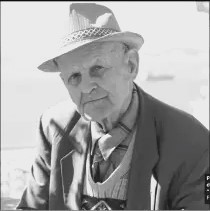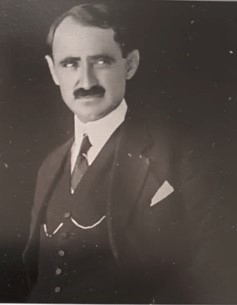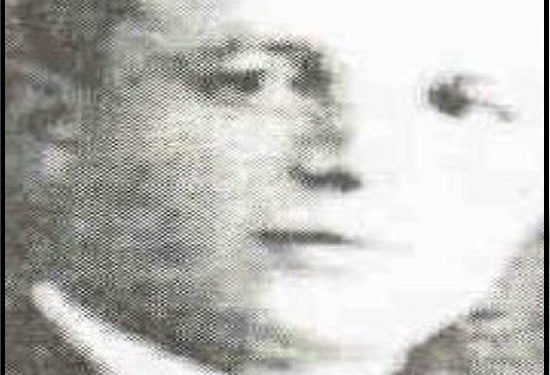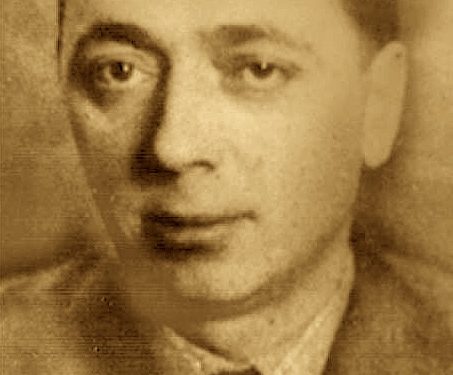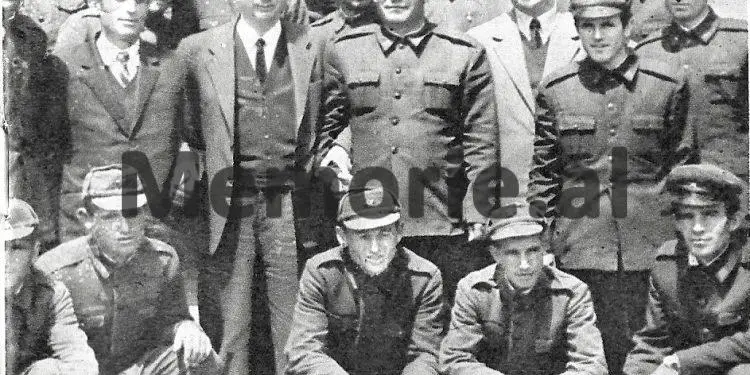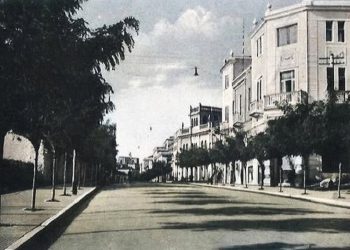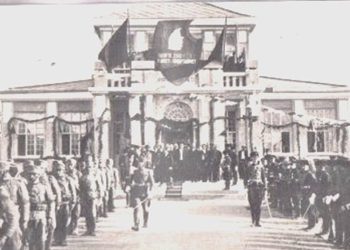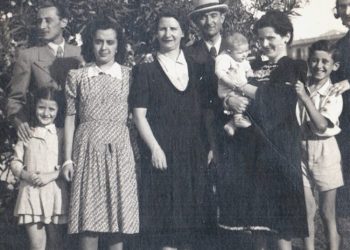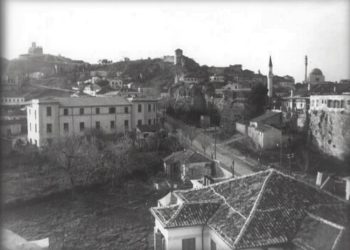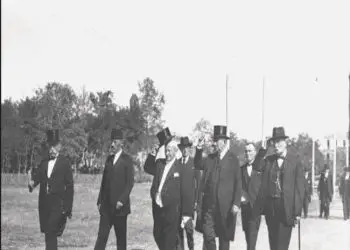By Petrit Velaj
Part Five
Memorie.al / During the years of World War II, the waves of the Anti-Fascist War swept us away without us realizing it. We were schoolmates, like city boys, me, Bajram Tushi, Hajredin Bylyshi, Hiqmet Buzi, Mumin Selami (Kallarat). Amidst the dreams and desires of the romance of literature. With these friends of mine, I have many memories. Our parents, our mothers, honest and generous people. A patriotic mother, mother Tina of Tol Arap, the well-known patriot, gathered us around her like a nest of birds. She was the mother of my childhood friend, whom we called: “the flower of Vlorë youth”, Vllas Arap. I think Mumin Kallarati gave this epithet to Vllas. I associated with every friend and comrade who was honest and sincere.This united us in our society with our peers: Hazis Sharra, Qemal Xhyheri, Xhemil Beqo, etc. Even though our opinions were different, we went together to picnics, play games and go to the cinema. A meeting at Lef Sallata’s house. Suddenly, politicized thoughts erupted in our society. The debate flared up with the young revolutionary, Kastriot Muço. He was an honest man. After four or five days, Kastriot said to me: “Petrit, when are you going to hold the youth meeting in the Çerekçie neighborhood? In the city’s activity, you were elected responsible for the neighborhood’s youth group”. After a few days, we organized the youth meeting in the “Çerekçie” neighborhood.
Continued from the previous issue
The consul understood his haste and tried to use soothing words towards him, but he turned left, without greeting, and left the consulate. That day, Qazim Kokoshi headed straight for Tirana, to the Royal Palace. He asked to meet the King. To the surprise of the courtiers, Ahmet Zogu, as soon as he heard about it, went up the stairs himself and waited for him, saying: “Qazim Effendi, order him inside…”! But Qazim did not go up the stairs. There, on foot, he informed him of the “black fate of Albania”. Qazim tried to leave, when the King put his arm around him, they went into a waiting room inside, and talked for over two hours. There they cried about the troubles of Albania.
In my prison cell, I also became friends with the former advisor of the Italian consulate, Mr. Dhionis Karbunara, who was over seventy years old. He was an honest and cultured man. Sometime later, I noticed that a Branch officer, sent by Hito Chako, began to come often, calling the wise old man and taking him with him outside the prison. They stayed together every day, from eight in the morning until twelve at noon. Since I had him by my side, by the bed where we slept, I said to him one day, when I saw that there was no one in the room, since the other prisoners had gone out into the yard: “Mr. Dhionis, can I ask you a question”? He got up from the bed and answered me: “Why are you asking me, my son”? – “I don’t like it that you go out of prison every day, with that Branch officer” – I said to him.
He looked at me with two fiery and sincere eyes and said: “Why don’t you cry about the trouble that has befallen me, but also ask me, my son”?! He got up and came to my bed where I was reading “The Divine Comedy” by Dante Alighieri. He lowered his head and said: “Listen, my son. Your question is very serious. I am glad that, at such a young age, you are delving so deeply into life. Here is what I am telling you, my son, believing that everything will remain between us. They are pressuring me and telling me every day to tell which Vlora residents have received money from the Italian consul, for the landing of fascist Italy in Vlora”. I, surprised by this problem, asked him: “Do you know them, sir”? “Yes, son, yes. In those damned lists there are here and there those Vlachs who have received money. I have fallen into a big mess. You understand, son, what I mean. The one who called me says, denounce yours first, then ours”.
It didn’t take more than two or three weeks and Uncle Dhionis was called by the guard officer. When he returned, he told me all the gossip. He had had a meeting for about four hours, with Hysni Kapo, in the building opposite the old prison, in the Executive Committee, in the “Karabash” neighborhood. He was happy and as soon as he entered the room he threw himself on my neck and said: “Petrit, thank God I survived! I had a long conversation with Hysni Kapo. After he found out about all the people who had received money from the Italians, for the invasion of Albania, he cut me off: “Let’s wrap this up, Dhionis. “You have no business denouncing any side”!
In prison, I spent most of my time reading books, especially Dante Alighieri’s “Divine Comedy”, Petrarch, Carducci, Lombardi and especially the poet of youth’s dreams, Lamartine. I started learning English with Professor Ali Radhima. I often sat and listened to the prison’s erudites: Kudret Kokoshi, Fatosh Kokoshi, Abdul Kuci, Stiliano Gaxho, Professor Muhamet Hoxha, Selahedin Peshkëpia, etc. In prison, there was also a set day for meetings with family members: once every two weeks, according to prison regulations.
It hurt my soul when I saw the hands of my father, mother, sister Fatime and brother Hulusi reaching out to the prison gate. My uncle’s son, Karehman Mezini, also came to visit me in prison, as did Qamil Bey Frashëri’s wife, Hajrie Frashëri. When it was market day, my family also came to visit me. Veli Shahini, a poor family from Porua e Myzeqesë, who were friends of my father. They pleased me when quince, pomegranates, grapes and other agricultural products fell. Sister Fatime, although with three children and her husband, Galip Haxhiu, who had fled abroad, was there, holding her desolate head, at the prison door.
While my father advised me: “Listen, my son, I’m not telling you to lower your head, but don’t get too carried away with these people, or they’ll get you killed…”! While my mother didn’t know what to say from the emotions she had, she just told me that she had brought me this and that dessert, that she had made the caste for me. One day I saw that she had something important to tell me. She was talking with her head off the wall. Her only brother, my uncle, Hamdi Mezini, had died. She knew that I loved my uncle very much. He was the chief customs inspector at the port of Skela. Not long after, my grandfather, Muço Mezini, a well-known cloth merchant in Vlora, also died. We loved my mother’s people very much. Next to my bed in the room was also Professor Shezai Radhima, the mathematician and honorable man. When he learned of my uncle’s death, he was very sad, because you had his daughter for a wife. So it was his father-in-law…!
One autumn day, a great earthquake struck, so strong that it seemed to us that the old prison walls were closing in on us. Pieces of tiles, rotten beams, and pieces of plaster fell into the courtyard. The Vlora prison was a building dating back to the Turkish era. As if that weren’t enough, the next morning the sky vented all its anger with a downpour. A downpour of rain filled the rooms. We went out into the prison courtyard. With our pants down, we were pacing around like horses in a field. What do we see? We hear a screaming voice. It was the warden Hate, the Charon of Vlora’s Hell, who was pushing a board through the murky waters that was heading towards the bathroom canal.
For a moment he stopped and shouted: “I got it!” It was like Archimedes’ Eureka. “Thank you”! the prisoners said. “I caught it, it almost took me by the neck, this sign”! – said Hatja and ran away. We said, the deserted sign, even though the wind blew it over the water in the yard with letters up, where it was written: “Come, I want you in the Branch. You have one question and you will come back. If the situation improves, in two or three days, you will come back home…”! Poor people. How could their minds lie and they returned home. From the Branch, everyone went to another world. In the spring of 1946, an officer of the Internal Affairs Branch came to us and told us that the dogs, the traitors, the political scoundrels were arrested. When someone asked him, only then did he agree to explain.
It was about the arrest of the group of nationalist youth from Vlora: Vendigjar Hamzaraj, Engjëll Kokoshi, Abdurrahman Kreshpa, Burim Kokoshi, Klito Lamaj, Eqerem Sorra, Petrit Mara, Dilaver Premti, Kujtim Kreshpa, etc. They were truly some of the smart and courageous boys of the city of Vlora. Their arrest created a real shock in the entire city. We were waiting for them to come to the cell, but we waited in vain, as they kept them in the State Security’s cells for a very long time. I was not able to meet them, because in those days we were going to be transferred to another prison. Despite the great suffering we endured, our spiritual medicine was the Labche songs we sang in prison.
I remember like now, we had two strong Labche groups, Dukatasit and Smokthinjotët, who alternated between each other. The group with singers from Gjorm – Brataj – Lepenica was also special. I remember Esat Sherifi and Muço Sherifi from Gjorm, virtuoso singers. Together with Sadik Sinan from Lepenica, they were the three first “violins” of the Labche symphonies. Among these fearless singers, lawyer Abdyl Kuçi and Professor Bego Gjonzeneli also joined. Abdul Kuçi, whenever he joined there, would wave to me and so slowly I too became a permanent member of this group. We usually sang ancient songs, from the folk tradition. There was also no shortage of songs about brave men like Gjoleka, Dervish Aliu, Luman Bala, Fejzo Xhafon…!
When the song was played in the prison yard, Bego Gjonzeneli would get up and dance the labçe dance so beautifully that I still remember his movements, full of dynamism and eloquence. Abdul Kuçi, leaning on the prison steps, would tell us: “Here, boys, this is the labe dance. Begua dances it like the old men, who danced it for odes”. One evening, we felt as if something bad was going to happen to some of us. The lab group began to sing a mournful song, which gathered all the prisoners around them.
The song was sung right there by Esat Sherifi from Gjormi and Rexhep Sulo from Berat. In the verses of that song, I remember that it said: “White Albania, mother/ what black clouds have caught you/ the boys who are now silver/ one by one they will eat the worms”!… I was sitting next to Professor Bego. Listening to that painful song that alluded to the new times of Albania, I said to him: “Professor, I remembered some wise words of Beaumarchais, who says that songs of despair are the most beautiful songs. I know many of them, which are true sighs”.
Dinner came. So half-starved we fell into bed and went to sleep. Midnight disturbed our sleep. They were the “Skifters of the Night”, as Bego Gjonzeneli called them, the prosecutors, Selim Alimerko, Namik Xhafa. They took some of the prisoners and took them to execution. There were two places of execution: “Bishti i Kalldrëmit” and “Ura e Ballistëve” in Qafe e Koçiu. Early the next day, a guard named Pulla, of Greek origin, told us how they stabbed Tahsim Murati, Qemal Xhyheri, Muharrem Sharra while they were in the car. Another night they took the two Lamaj brothers from Treblova to be shot, as well as Meto Kokosh. When they were getting out of the car at the execution site, the chains broke and they fled into the darkness of the night. Meto was captured the next day and tortured until he died from the torture.
When Kudret Kokoshi heard these in prison, he trembled all over. Meanwhile, Lamaj was killed two or three weeks later, in an attempt by the Pursuit Forces. The Vlora prison was a small hell. Suddenly, on September 14, 1946, Muço Maska arrived accompanied by the executioners of the Internal Affairs Branch and read a list of 81 prisoners, including my name. They lined us up in the yard. After tying our hands, they told us: “We will take you to Dante’s Hell, where you will not even see the sun with your eyes.” There, around midnight, they put us in cars. Forty people tied together with a chain. The cars were accompanied by eight military cars. We traveled all night through the fields and mountains. We talked to ourselves. All the prisoners asked themselves: “Where the hell is this Dante’s Inferno in Albania? Where does it fall?…”
“Dante’s Inferno” – Burreli
On September 14, 1946, as there were 81 of us, we were taken to the Burreli prison. It was evening. We found ourselves in front of some ancient walls. There we learned that it was; “Dante’s Inferno – Burreli”. At the gate, a sallow-skinned officer came to us, who said: “I am the director of this prison. My name is Vangjel Rrembeci, from Korça”. Chattering his teeth with evil eyes like Satan, he added: “Here, where you will set your feet, here your teeth will fall…”! The two leaves of the Iron Gate opened. In the middle of the courtyard, there was an uncovered well, without a mouth. Dusk fell. There was no light anywhere. An officer, with a lantern in his hand, was looking at us one by one. We were very hungry. We had traveled for over thirteen hours.
After a while, we heard other voices in the yard. They were prisoners from Korça, then from Berat. Later, the prisoners from Shkodra came. They put us in rooms. Iron bars at the entrance. Iron bars on the stairs, iron bars in the corridors, iron bars on the door of the room. The burrel, with his first look, gave us to understand that it was worse there than in the cages of wild beasts. That night it seemed to us that we spent a month…! The next morning they said to us: “Do you want bread?! You will wait, poor people, because our mills were broken, our ovens were destroyed…! As for water, here is the well, in the middle of the yard…”! The well had no mouth and the streams of water that flowed through the yard drained there. Only two days passed and Tahir Hoxha’s nephew, Niko Hoxha, came to our prison, supposedly to meet his uncle.
What didn’t he tell his uncle…! Those words that came out of his mouth seemed to me like pieces of metal, coming out of the iron gears of his teeth…! The Head of the Internal Affairs Branch, Banush Goxhua, whom we hated, because every time he came to the prison corridors, he whispered to the guards that we were living without a flag and without a homeland. After 3-4 days, the situation of the prisoners in terms of economic treatment changed radically. The kitchen was arranged: meat, vegetables, fruit, bread and water. Some of my friends, also prisoners, asked me if they would turn the prison into a holiday home for us…! When, after five days, the head of the Internal Affairs Department, Banush Goxha, and the director of the Prison, Vangjel Rrembeci, came to visit the prison cells.
Banush Goxhua gave a speech, telling us: “Hey, do you see what the Party and the people’s power are doing for you? We are supporting you with white bread and beef. We are leaving you food from your families as much as you want. Look how generous and generous we are. This is what the Party has educated us to do. You should have a shred of honor and write to your families, so that they do not send food, but come once every 6 months to visit you. The people are still in poverty, but the Party finds food for you at the end of the earth”. What happened later? Some of the short-sighted prisoners believed and wrote to their families. The answers also came. Some concluded: “Long lives the Party! Long live comrade Enver!” But most prisoners did not write. On December 15, 1946, a real storm broke out in the Burrel camp.
Over a hundred or so policemen, after searching us naked, took away our food, books, papers and left us with only a blanket, a quilt and a mattress. Voices could be heard in the corridors, like the cries of wolves: “Don’t think we’ll give you meet every day. We’ll let you die like worms”! From that minute, beatings, screams and blows could be heard in the yard, corridors and rooms. The executioner Vangjel Rrembeci, Koçi Xoxe’s close friend, had written on the walls of the camp in black letters: “Burreli – the extermination camp”. Year 1947. The Head of the Internal Affairs Branch, Banush Goxho, like a rabid beast, comes to the prison with a list in his hand. In the presence of the guards Fahri, from Pogradec, and Jahja, from Kolonja, he reads the names of those who were to be separated from the other prisoners.
He read the list aloud: Qemal Vrioni, Mihal Ballkameni, Atif Golja, Xhevat Korça, Koço Tasi, Visarion Xhuvani, Anton Kosmaçi, Kudret Kokoshi, Tahir Hoxha, Mihal Zallari, Ali Maliqi, Petrit Velaj, Hysni Alimerko, Abdurrahman Kreshpa, Sokrat Dodbiba, Zenel Kazazi, Sali Vuçiterrni, Hasan Xama, Skënder Qyteza, Abdyl Kadiu, Gjergj Kokoshi, Avni Bejkova, Jahja Kurti, Xhevdet Kapshtica, Lawyer Jani Thomai, Isuf Selmani, Hivzi Xhilaga, Engjell Kokoshi, Beqir Jazo, Jazo Ademi, Sami Bitinicka, Nino Kurti, Pjetër Berisha, Sabaudin Resuli, Aleksander Çurçia, Novruz Nivica…!
After our names were called, we were all isolated in the dungeons, six people together. These people were the death row convicts. They began the torture with Qemal Vrioni and continued with others. They told us: “That’s it.” They tortured the black Qemal to death. Two executioners tortured him. While two soldiers at the door of the dungeons, they played the çiftelivs while singing epic songs from the north. They also tortured Atif Gole and Mihal Ballkameni, until they died from torture. Memorie.al




